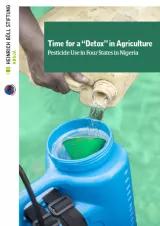Time for a "Detox" in Agriculture
Content is no longer being updated
Nigeria is well known for its oil wealth, but the agricultural sector is the backbone of the country’s economy. Agriculture accounts for about 22% of GDP, compared to oil and gas (9.5%), manufacturing (9.7%) and trade (16.1%). Over 36% of the active labour force is employed in agriculture directly.
However, the sector faces a number of major challenges. It needs to feed a rapidly expanding population in a warming climate characterised by increasingly frequent floods and droughts that reduce soil fertility, while parts of the country remain in conflict, ranging from the Boko Haram crisis in the northeast to farmer-herder clashes in the Middle Belt. The ongoing Covid-19 pandemic and associated restrictions have further exacerbated the situation through supply-chain disruptions that have led to spiraling food-price inflation.
Nigerians already experience a huge malnutrition burden. The national prevalence of stunting of children under the age of five is 43.6%, significantly higher than the developing-country average of 25%. Nigeria’s under-five wasting prevalence of 10.8% is also higher than the developing-country average of 8.9%. Almost half (49.8%) of women of reproductive age suffer from anaemia, and 6.3% of adult men and 6% of women have diabetes.
The country is currently unable to meet its domestic requirements for food as the population growth rate has outpaced the rate of food production. According to the United Nations, the number of people living in Nigeria is expected to more than double by 2050 from its current level of just over 200 million, fuelling rapidly growing consumer demand for food. Government policies have therefore focused on increasing productivity. However, these mainly promote conventional “industrial” agriculture that requires high external inputs, such as pesticides and artificial fertilizers.
As in many other African countries, the intensification of agricultural production to meet the demand of both local and export markets is increasing the use of pesticides in Nigeria. In conventional agriculture, which often utilizes monoculture cultivation, pest invasions can drop yields by up to 40%. Climate change can bring invasions by newly arrived pests that may even increase the rate of loss. This predicament is often used to justify the heavy use of pesticides.
However, this level of use has resulted in negative health, environmental and economic consequences in Nigeria and worldwide. Because pesticides are widely distributed in the environment – in the air, soil, water and plants – water and soil quality and related biodiversity are decreasing. There is also evidence that an increase in chronic health conditions may be related to pesticide exposure. Furthermore, exposure to more than one pesticide, especially in food, and the cumulative effect of these mixtures on our health is still unknown.
As Nigeria pushes its agricultural sector towards more efficient production and a greater role in the country’s economic diversification strategies, this study surveys the pesticides that are currently in use, their effects on humans and the environment, and how policy influences pesticide use.
It also identifies gaps and possible solutions to ensure more sustainable food production through agricultural techniques that both require fewer chemical inputs and are crucial to mitigate growing environmental challenges such as erosion, loss of biodiversity, and land degradation. These would help to ensure improved food security and safety at home and also create better conditions for export to countries with stricter food-safety standards.

